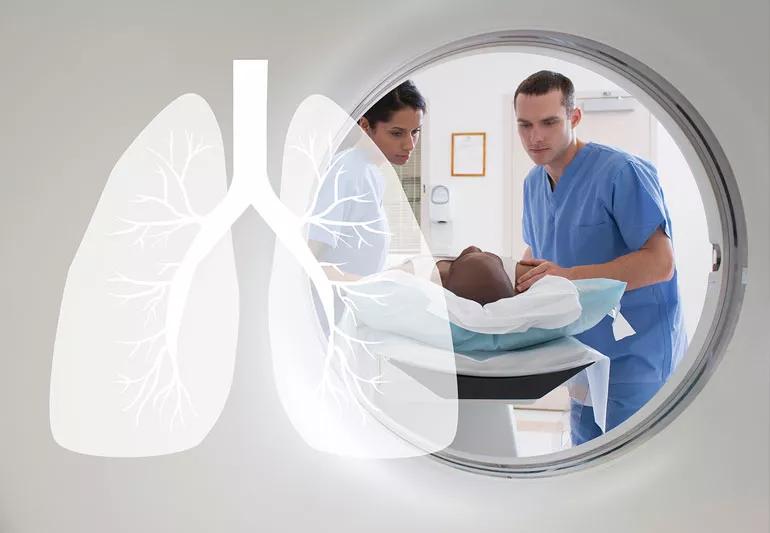Early detection through screening can improve survival numbers

Image content: This image is available to view online.
View image online (https://assets.clevelandclinic.org/transform/a2e06a23-285a-4856-ac3e-8ca62d40d9c1/CT-Lungs-482149433-770x553_jpg)
Patient being prepped for CT scan of lungs
Have you ever wondered why lung cancer is still such a deadly disease? If you’re like most people, you might not even realize how common or deadly lung cancer is. So let’s review the numbers.
Advertisement
Cleveland Clinic is a non-profit academic medical center. Advertising on our site helps support our mission. We do not endorse non-Cleveland Clinic products or services. Policy
Lung cancer is the most commonly diagnosed cancer worldwide (excluding non-melanoma skin cancer), with 2.1 million new cases in 2018. Lung cancer also is the leading cause of cancer-related death in the United States and worldwide.
It’s the leader by a lot. Lung cancer kills more Americans — around 143,000 — every year than the next three most common cancers — breast, colon and prostate — combined, according to the American Cancer Society.
Lung cancer isn’t the No. 1 cancer killer simply because it’s common. It kills a disproportionately high percentage of the people it affects compared with other cancers.
Take breast cancer, for example. It’s the most common cancer in women in the United States, and the second-leading cause of cancer deaths. But 90% of women diagnosed with breast cancer will survive longer than five years, because of a combination of early detection and effective treatment resulting from decades of tremendous investment in research.
The five-year survival rate for all patients with lung cancer is 18% — a statistic that has not changed significantly in decades.
So how is this lack of improvement possible? The number of deaths from breast cancer has fallen consistently since 1989. This is thanks to a combination of better treatments and early detection through screening mammography. The majority of breast cancers in the United States are now detected at a curable point of development, or stage. And improvements in post-operative treatments with chemotherapy and hormonal therapy have led to significant improvements in cure rates.
Advertisement
Lung cancer is more difficult to diagnose. Because you can neither see nor feel your lungs, the main way lung cancer is diagnosed is when it causes symptoms such as a cough or pain. Unfortunately, symptoms usually only occur when the cancer has become too advanced to cure.
However, much like breast, colon or many other common cancers, when lung cancer is detected as the earliest stage, it can be cured with surgery or radiation 80% or more of the time.
So how do we advance from 18% to 80% — or even 100%? A good start is better early detection, which can “stage shift” more patients from late-stage cancer to earlier, more curable, stages.
Screening for lung cancer with low-dose lung CT scans has been proven to detect more early-stage cancers and decrease deaths from lung cancer by 20% in people ages 55 to 75 who have smoked 30 pack years and have quit for fewer than 15 years.
CT screening has been covered by private insurance since 2014, thanks to high-level recommendations from the U.S. Preventative Services Task Force, and was approved for coverage by Medicare in 2015 under certain restrictions. Still, the screening has not yet been widely adopted.
Widespread recognition and adoption of CT screening may finally start lung cancer down the path to eradication, following in the footsteps of other cancers with effective screening, such as breast and cervical.
We are also working on more effective post-operative treatments to improve the cure rates for those who have lung cancer after surgery, through the National Cancer Institute-sponsored ALCHEMIST trial. The clinical study targets genetic defects with precision drugs or by harnessing the immune system to eradicate microscopic cancer cells.
Of course, greater public health efforts to prevent tobacco smoking and aid in smoking cessation would have the most dramatic effect on lung cancer death rates.
Lung cancer screening will be tightly tied to smoking cessation counseling, which may make both efforts more effective.
In the United States, decreasing smoking rates have led to falling death rates in men since 1991, and in women since 2003. But while tobacco smoking rates have been falling in the United States since the 1970s, the opposite has been true in the developing world.
Behavior like this will, unfortunately, keep lung cancer deaths in the top spot globally for the foreseeable future — unless we use our available screening, counseling and treatment tools to stay one step ahead.
Advertisement

Sign up for our Health Essentials emails for expert guidance on nutrition, fitness, sleep, skin care and more.
Learn more about our editorial process.
Advertisement
Lung cancer and treatment can take its toll, but support is available to help you live well
Getting your treatment plan just right can take some fine-tuning, but the appointments will taper off
Side effects like nausea and fatigue are common, but there are ways to feel better
Knowing the signs (like a cough that won’t quit) may help some people detect lung cancer early
Allergies, postnasal drip, asthma or reflux could be to blame for a cough that won’t quit
‘Walking pneumonia’ is milder and doesn’t always require medication — but it’s also highly contagious
Wearing a scarf, adjusting your outdoor activities and following your asthma treatment plan can help limit breathing problems
Vaping exposes you to thousands of chemicals, including many that are known to cause cancer and lung disease
Prioritize your health by managing stress, strengthening your social connections and getting quality sleep
Bolsters, blankets, pillows and blocks can offer extra support, stability and comfort
Allergies, postnasal drip, asthma or reflux could be to blame for a cough that won’t quit